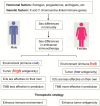Sex Differences in Cancer Immunotherapy Efficacy, Biomarkers, and Therapeutic Strategy
- PMID: 31487832
- PMCID: PMC6767080
- DOI: 10.3390/molecules24183214
Sex Differences in Cancer Immunotherapy Efficacy, Biomarkers, and Therapeutic Strategy
Abstract
Sex differences in innate and adaptive immune responses are known, and women generally mount a stronger immune response than men. Cancer immunotherapy, represented by immune checkpoint inhibitors (ICIs), has revolutionized the treatment of cancer, and sex differences in cancer immunotherapy are just starting to be revealed. Here, we summarize recent research progress concerning sex differences in cancer immunotherapy efficacy. On their own, ICIs tend to be more effective in male cancer patients compared with female patients, while ICIs combined with chemotherapy tend to be more effective in female patients than male patients. Male tumors are usually more antigenic than female tumors, and this is reflected by their increased number of tumor mutations and cancer germline antigens. The biomarker tumor mutational burden (TMB), which reflects tumor antigenicity, is more effective at predicting immunotherapy response for female lung cancer patients than for male patients. In this review, we propose different therapeutic strategies for the different sexes: For male cancer patients, the immune environment should be enhanced, whereas for female cancer patients, tumor antigenicity should be enhanced.
Keywords: biomarker; cancer immunotherapy; immune checkpoint inhibitor; sex differences; tumor mutational burden.
Conflict of interest statement
The authors declare that they have no conflict of interest.
Figures

References
Publication types
MeSH terms
Substances
Grants and funding
LinkOut - more resources
Full Text Sources

